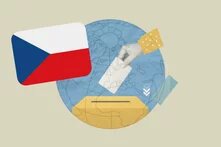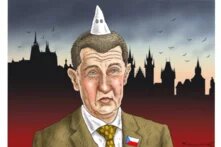Russia’s aggression threatens not just those states it sees as its enemies. It also threatens our life in peace, the guarantee of civic and human rights, freedom and democracy. None of these can be taken for granted, as Russia’s war is being waged against the very principles that lie at the heart of our community, writes Czechia's Foreign Minister Jan Lipavský.

24 February 2022 marks not just the start of the Russian invasion of Ukraine, but also the beginning of a new era. Acts of cruelty hitherto unimaginable in the Europe of today are now taking place right on our doorstep. Russia is behind these acts. Russia wants to strip Ukraine of its right to self-determination and thereby expand its own sphere of influence, flouting international law and the world order underpinned by it.
Russia’s aggression threatens not just those states it sees as its enemies. It also threatens our life in peace, the guarantee of civic and human rights, freedom and democracy. None of these can be taken for granted, as Russia’s war is being waged against the very principles that lie at the heart of our community.
Brave Ukrainian men and women are defending not just their fatherland, they are also defending our values and our fatherlands. This is why we must get behind them, starting by taking in refugees (in the Czech Republic, we have already registered approximately 300,000), continuing with humanitarian aid and supplying them with desperately needed weapons. The Czech Republic was one of the first states to understand this. It is also one of the countries calling for the toughest sanctions against Russia. However, I must stress that we neither hate Russians nor wish to escalate the situation. We just cannot see any other way of stopping the evil in its tracks. Perhaps one day, the Russians will even see our point of view.
Our own historical experience is something else that holds us true to our principles. The invasion of the Soviet army in 1968 is still within living memory. At the time, the Kremlin assured us that its soldiers were only coming to liberate our citizens – yet its real objective was to rob them of all liberty. There followed 20 years of oppression, which ended only with the Velvet Revolution. This experience allows us to put ourselves into Ukrainian shoes. We can likewise seem that the Ukrainians aspire to the same values the Czechs and Slovaks dreamt of in 1968 and would not fully experience until 1989 – consolidated by joining NATO and the EU.
The second formative event unfolded in Munich, in 1938. The pact sealed there left behind a strong feeling of injustice in many Czech people, when they saw that the major powers were prepared to throw an allied country under the bus in response to Hitler’s threats, in return for a dubious peace. It could be that the West genuinely believed that the gamble would pay off and that the sacrifice of a small democratic state would protect Europe from far worse. However, this does not excuse the West. Its tragic mistake simply vindicated Hitler in his belief that he did not have to stop there. This experience teaches us that appeasement never stops aggressors. But that is not all. The case of Czechoslovakia teaches us that desperate countries can resort to desperate measures, such as seeking dubious alliances. Czechoslovakia sought them in the East and ended up under the yoke of a Communist dictatorship for 40 more years – a further reason to take all possible steps to save the Ukrainians from making the same mistake. They must be made to feel that they are welcome here in the West. Candidate status for EU accession down the line will do an enormous amount to keep the Ukrainians on board in these difficult times!
As for our strategic partner Germany, its view of Russia and Eastern Europe is clearly shaped by very different experiences. In the 1930s and 40s, Germany unfortunately took on a terrible role, not dissimilar to the one being played by Russia at the moment. Yet how Germany has dealt with its own past is an enormous inspiration to us. It has come a very long way since then and is now a strong democracy, an economic powerhouse and a driving force behind European integration. It has also shown that it is capable of self-correction. This also relates to its Russian policy with regard to the Russian aggression. Germany is still hesitating to take a stronger leadership role. However, that is only to be expected, as new eras bring doubts and fears. This is something else we know from our past. Russia threatens us all and the effective protection of all we hold dear requires extraordinary decisions to be made. This can be done far more effectively by working together with partners who support and encourage each other. We, the people of the Czech Republic, are ready and willing to be that partner for our German neighbours. We are also counting on Germany to become Europe’s driving force once again at this fateful moment in time.
This article was first published in the Frankfurter Allgemeine Zeitung on 4 May 2022, translated with their permission and slightly edited for context.


